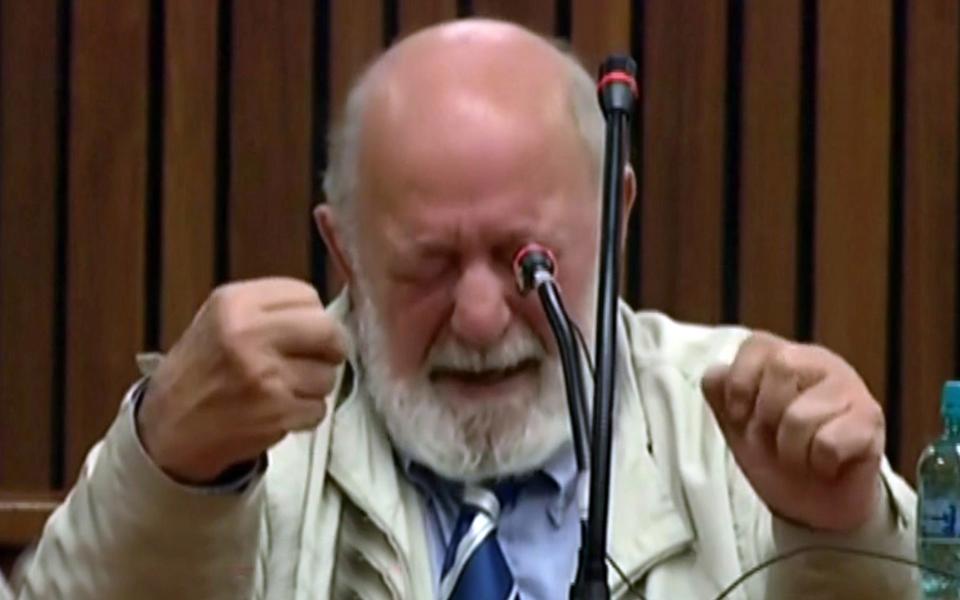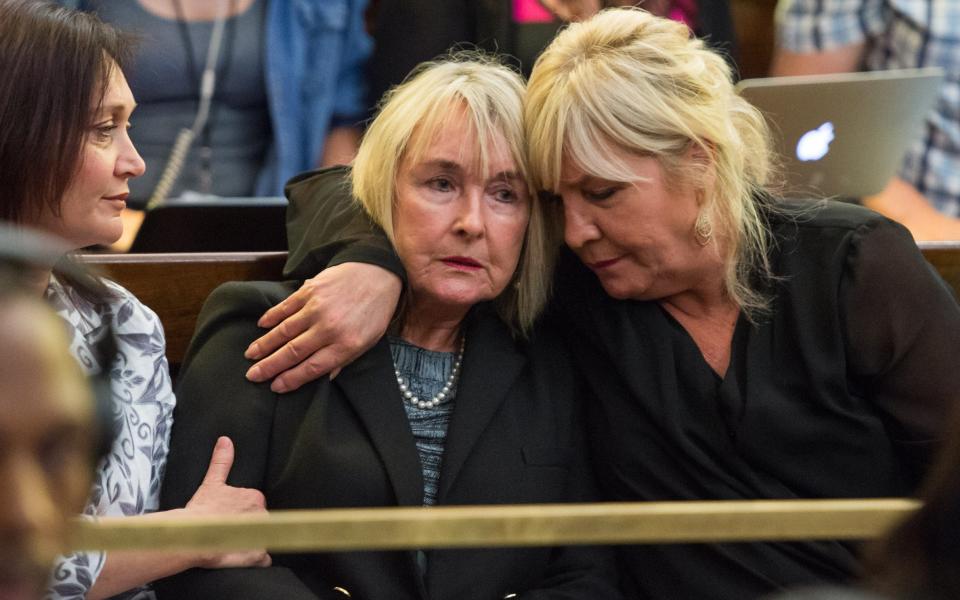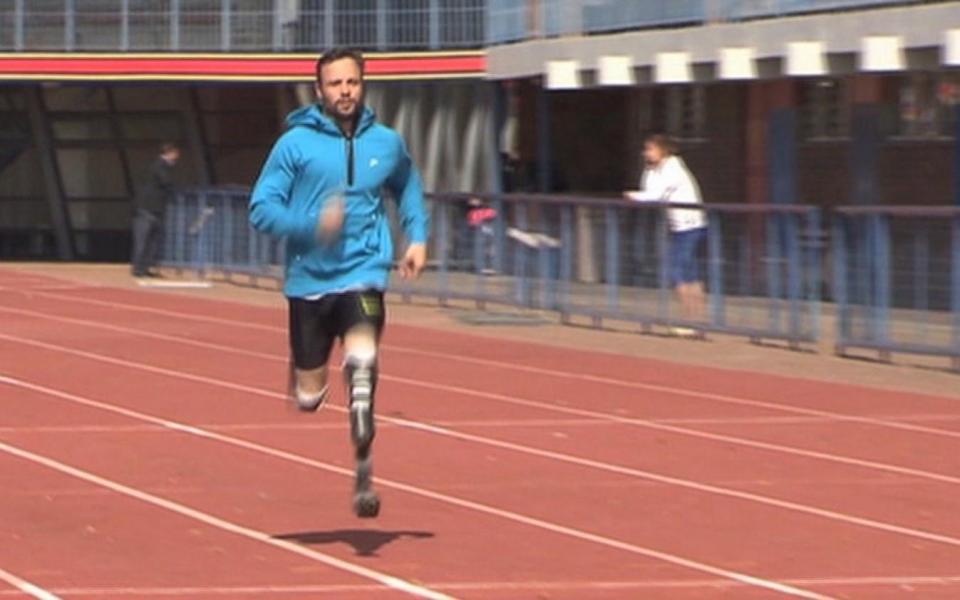Disgraced Olympian Oscar Pistorius of South Africa has been released on parole and will be released from prison on January 5.
The amputee blade runner, who won six Paralympic gold medals and reached the semi-finals of the 200m sprint at the 2012 London Olympics, was told he could walk free after serving nine years for the murder of his girlfriend, Reeva Steenkamp, in 2013.
The decision marks a new chapter in a case that continues to fascinate South Africa and the world beyond, and which has produced one of the legal cases of the century.
But it’s another painful blow to the family of the woman he killed, who believe he never told the truth about the night he shot their daughter. “Only Oscar knows the truth,” her father, Barry Steenkamp, said earlier this year in his final interview before the 80-year-old died in September. ‘If he had told the truth in the beginning, he would have felt a lot better. People would have forgiven him more quickly.”
Pistorius was on top of the world when he fired four shots through a bathroom door in the early hours of Valentine’s Day 2013, killing Steenkamp, who was inside.


The year before, he had competed in London on his custom-made carbon fiber prostheses against the fastest able-bodied athletes in the world. The triumph of the boy who had two legs amputated below the knee in his youth due to a congenital condition became an inspiring example of humanity’s ability to overcome disability.
In South Africa, a country that embraces unifying heroes, he was an idol.
With his position as favorite son, it was not surprising that he soon dated one of the country’s favorite daughters, model and television personality Reeva Steenkamp, who was the face of an anti-bullying campaign.
What seemed like a gilded life of red carpet events ended just three months into their relationship when he opened fire in his Pretoria home with his 9mm pistol.
Prosecutors alleged that Steenkamp, then 29 years old, was killed while hiding in the toilet after a heated argument.
Pistorius, the only witness, claimed it was a terrible accident: he did not know that his girlfriend had gotten up to go to the toilet and he had mistaken her for a dangerous intruder behind the door.
The process has fascinated South Africa. It was the first in the country to be televised and the daily events were watched in prime time.


“People were angry with Oscar,” recalls David O’Sullivan, a prominent journalist who hosted a nightly television panel of legal experts. “He was supposed to be flying our flag, and none of that was racist: blacks and whites said the same thing. They also felt betrayed by Oscar because murder is so prevalent in South Africa.”
As the hearing progressed, South Africans debated every revelation and legal point.
“When the lawyers and I went out for drinks, people would stop them for autographs and selfies,” says O’Sullivan.
The high-profile case also highlighted that the country’s homicide epidemic, and in particular the high levels of violence against women, did not just affect townships, said Lisa Vetten of the Gender Violence and Urban Transformation Project at the University of Johannesburg.
“People became interested and discovered that this wasn’t just happening in poor black communities,” she says. “Six women are murdered in South Africa every day.”
After months of evidence, Judge Thokozile Masipa, one of the country’s first black female judges, appeared to believe Pistorius’ story and convicted him of manslaughter, a charge similar to manslaughter.


Yet her decision was subsequently overturned by the Supreme Court, which ruled that even if Pistorius thought he was shooting at an intruder, he must have reasonably foreseen that the person behind the door would die. As such, he was guilty of murder under the principle of dolus eventualis, an obscure legal term that quickly entered the South African vocabulary.
Chris Greenland, a retired judge who was one of many to dissect the case on television every night, explains: “For example, if someone is shooting birds in your yard, knowing that there is a schoolyard in the background, he can be argued that the shooter foresaw that he/she might also kill a child.”
When Judge Masipa gave Pistorius six years, the Supreme Court intervened again, calling the term “shockingly lenient.” Pistorius was ultimately sentenced in November 2017 to thirteen years and five months, taking into account the time he had already served.
Pistorius has not been depicted since. Unconfirmed reports from his time in Atteridgeville prison suggest he has grown a beard, gained weight and taken up smoking, making him unrecognizable as the elite athlete he once was.
Earlier this year, the Constitutional Court ruled that authorities had incorrectly calculated when he should be eligible for parole. Confusion over when his sentence began meant he should have been eligible several months earlier.
Before he died, Barry Steenkamp stated that he would not object if authorities granted parole, although he acknowledged that his thoughts might change as the date approached. He had met Pistorius in prison as part of a restorative justice program, but his wife June refused, saying she was afraid of what she would do if she confronted him.
She also did not attend today’s parole hearing. Instead, June Steenkamp wrote a letter to be read at the meeting, detailing the devastating personal consequences of Pistorius’ crime and saying she did not believe the ex-athlete had been rehabilitated.
“Rehabilitation requires that a person commit himself honestly, with the full truth of his crime and its consequences. No one can claim to be remorseful if he or she is not able to fully engage with the truth,” she said.
Despite this, officials ruled that Pistorius could be released. As part of his parole, which will last until December 5, 2029, he will be prohibited from leaving his Pretoria area without permission and will be required to attend an anger management program and perform community service.


Family sources told The Telegraph that Pistorius would live with his uncle, Arnold Pistorius, a wealthy property developer, at his Waterkloof mansion in Pretoria. Now 37, however, Pistorius’ career as an athlete is over. However, he may still be able to find work in coaching or elsewhere in the sports industry, sources close to the matter predict. He can also choose to study.
If he cannot overcome his fame in his home country, Pistorius may also follow the example of many South Africans and choose to emigrate after the end of his parole. He has two siblings who are believed to be abroad, including a sister, Aimee, who is said to live in London.
However, as Pistorius ponders his future today, June Steenkamp, now widowed and reportedly in dire financial circumstances, is left with the past and her daughter’s legacy.
Originally from Blackburn in Lancashire, she has set up a foundation in Reeva’s name to raise awareness of violence against women and children. Speaking earlier this year to mark the tenth anniversary of her daughter’s death, she admitted that every day was difficult; she was still grieving.
The 78-year-old said at the time: “We just love her so much and miss her. Part of our lives is over, but we will see her again one day and we look forward to that.”